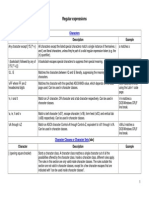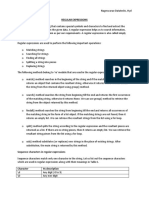Regular Expression
Uploaded by
Vidya ShreeRegular Expression
Uploaded by
Vidya ShreeTable 13.6. Metacharacters and metasymbols.
Metacharacter/Metasymbol Character Class: Single Characters and Digits . [az09] [^az09] \d \D \w \W \0 \b \f \n \r \s \S \t ^ $ \A \b \B \G \Z \z X?
What It Matches Matches any character except newline Matches any single character in set Matches any single character not in set Matches one digit Matches a non-digit, same as [^09] Matches an alphanumeric (word) character Matches a non-alphanumeric (non-word) character Matches a null character Matches a backspace Matches a formfeed Matches a newline Matches a return Matches whitespace character, spaces, tabs, and newlines Matches non-whitespace character Matches a tab Matches to beginning of line Matches to end of line Matches the beginning of the string only Matches a word boundary (when not inside [ ]) Matches a non-word boundary Matches where previous m//g left off Matches the end of the string or line Matches the end of string only Matches 0 or 1 of x
Character Class: Whitespace Characters
Character Class: Anchored Characters
Character Class: Repeated Characters
Table 13.6. Metacharacters and metasymbols.
Metacharacter/Metasymbol X* X+ (xyz)+ X{m,n} was|were|will (string) \1 or $1 \2 or $2 \3 or $3 New with JavaScript 1.5 (?:x)
What It Matches Matches 0 or more of x Matches 1 or more of x Matches one or more patterns of xyz Matches at least m of x and no more than n of x Matches one of was, were, or will Used for backreferencing (see "Remembering or Capturing" on page 443) Matches first set of parentheses Matches second set of parentheses Matches third set of parentheses Matches x but does not remember the match. These are called non-capturing parentheses. The matched substring cannot be recalled from the resulting array's elements [1], ..., [n] or from the predefined RegExp object's properties $1, ..., $9. Matches x only if x is followed by y. For example, /Jack(? =Sprat)/ matches Jack only if it is followed by >Sprat. /Jack(?=Sprat|Frost)/ matches Jack only if it is followed by Sprat or Frost. However, neither Sprat nor Frost are part of the match results. Matches x only if x is not followed by y. For example, /\d+(?!\.)/ matches a number only if it is not followed by a decimal point. /\d+(?!\.)/.exec("3.141") matches 141 but not 3.141.
Character Class: Alternative Characters Character Class: Remembered Characters
x(?=y)
x(?!y)
You might also like
- Jan Goyvaerts - All About Regular Expressions-Https - WWW - Regular-Expressions - Info - (2019)No ratings yetJan Goyvaerts - All About Regular Expressions-Https - WWW - Regular-Expressions - Info - (2019)206 pages
- Regex Cheat Sheet: Meta Characters - What Meta Characters MeanNo ratings yetRegex Cheat Sheet: Meta Characters - What Meta Characters Mean1 page
- List of Regular Expressions: Character Result/UseNo ratings yetList of Regular Expressions: Character Result/Use2 pages
- Python Course: Session 6b - Regular ExpressionsNo ratings yetPython Course: Session 6b - Regular Expressions11 pages
- Regular_Expressions_guide_-_Mozilla_developer_centerNo ratings yetRegular_Expressions_guide_-_Mozilla_developer_center12 pages
- Regular Expressions in Java: Dr. Mohamed Y. DahabNo ratings yetRegular Expressions in Java: Dr. Mohamed Y. Dahab6 pages
- Your Oracle R - : Regular Expressions in An Oracle World100% (1)Your Oracle R - : Regular Expressions in An Oracle World43 pages
- Oow Getting Regular With Regular Expressions100% (1)Oow Getting Regular With Regular Expressions62 pages
- Notes in Additional Mathematics with Examples and ExercisesFrom EverandNotes in Additional Mathematics with Examples and ExercisesNo ratings yet



























































